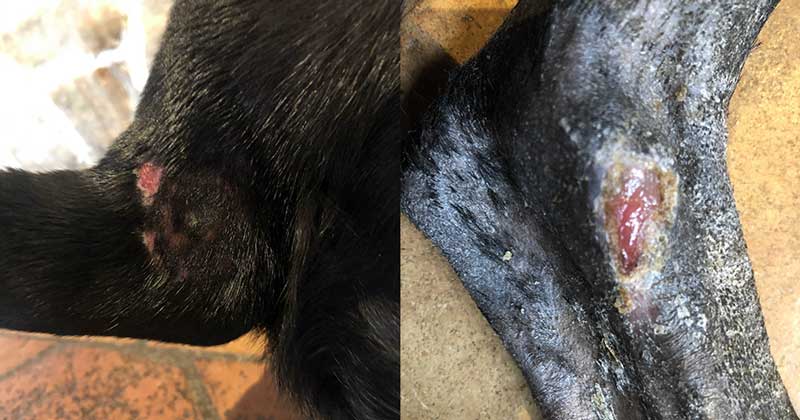22 Jan 2021
Anderson Moores reports successful treatment of suspected cutaneous and renal glomerular vasculopathy case in Labrador retriever Molly.

Molly was successfully treated for Alabama rot.
Clinicians at Anderson Moores referral centre have successfully treated a case of suspected cutaneous and renal glomerular vasculopathy (CRGV) in a Labrador retriever.
CRGV, more commonly known as Alabama rot, was first detected in the late 1980s and in the UK in 2012. It has a 90% mortality rate.
However, Anderson Moores has enjoyed a success in the case of Molly, who was referred to the internal medicine team just before Christmas with limb swelling, and a deep and painful ulcer on one leg.
Blood tests indicated poorly functioning kidneys, which, along with a low platelet count, increased liver values and blood smear changes, further supported CRGV as the cause.
David Walker, who leads the team and is a UK authority on the disease, said: “Although heartbroken to hear the news, Molly’s owners were keen to do everything possible for her.
“A urinary catheter was placed to help us balance Molly’s fluid input to her output and ensure her kidneys were continuing to produce urine.
“Molly also received other medications to help counteract some of the other effects of CRGV and acute kidney injury on the body, while her skin lesions were appropriately managed and dressed, with our soft tissue surgeons routinely monitoring the progress of these.”
Molly’s urine production and blood work initially seemed to be following an all-too-familiar pattern of deterioration, making the team fear the worst.
However, after four days’ treatment, things started to improve, and, after two nerve-wracking weeks, Molly was discharged to continue her recovery at home.

Mr Walker added: “Recovery for patients such as Molly is often prolonged, but she has continued to do well.
“Molly’s journey is heart-warming – especially during these difficult times – and has brought immense joy to not just her family, but also the whole team at Anderson Moores – especially those involved in her care.
“Sadly, stories such as Molly’s are relatively rare, with CRGV remaining a devastating disease, without a known cause or treatment, and which has taken away many beloved dogs from their families.”
Anderson Moores Veterinary Specialists remains heavily involved in ongoing research into the causes of CRGV.